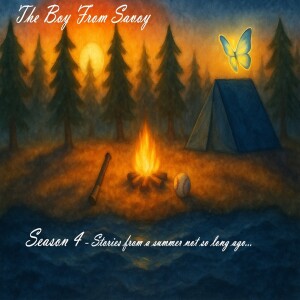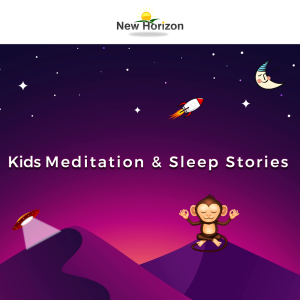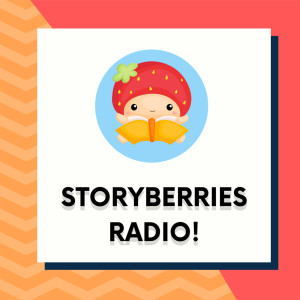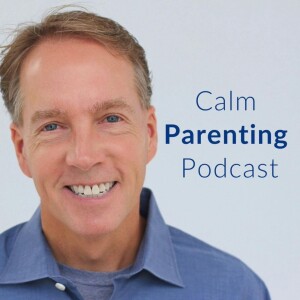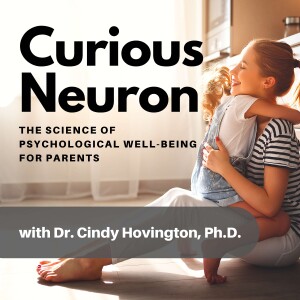

Reflective Parenting by Curious Neuron
https://feeds.buzzsprout.com/1255388.rssEpisode List

A science-based tool that helps you shift your perspective (and build your resilience)
Send us a textIn this episode, we explore the idea of “shifting your lens” — a powerful metaphor grounded in science that helps parents understand how their interpretation of a situation shapes their emotional response. Drawing on the work of psychologist James Gross and his research on cognitive reappraisal, we break down how the lens you’re wearing (like blame, control, or shame) can fuel conflict and dysregulation, especially in moments of parenting stress.You’ll learn how to identify the lens you’re in, how to shift your lens to something more helpful (like curiosity or compassion), and how this shift not only supports your own regulation but also helps you model emotional intelligence for your child. Real-life parenting examples, practical tips, and reflection prompts will help you bring this tool into everyday moments even when things get messy.Read our blog post here:https://curiousneuron.com/2025/08/03/how-to-shift-your-lens-and-stay-calm-in-parenting-conflicts/Read a science article:For Whom and What Does Cognitive Reappraisal Help? A ProspectiveStudyWatch it on YouTube:https://youtu.be/TOURlBqtmIcMore ways to build emotion regulation skills with Curious Neuron! Record your message to ask a question, share an insight or give us some feedback! https://www.speakpipe.com/ReflectiveParentingPodcast Start your 7 day FREE trial of the Reflective Parent Club A science-based course that helps you learn how to cope with emotions, stress, your child's behaviour and your partner! Plus, a weekly coaching call to help you build awareness and practice new tools. https://curiousneuron.com/reflective-parent-club/ Join our FREE Monthly Parental Well-Being Webinar Series: https://tremendous-hustler-7333.kit.com/989145490b Grab a Free Resource: FREE Workbook: Staying Calm When Your Child Isn’t: A Parent’s Guide to Triggers and Emotions FREE Kids Activity: Help! My Emotions Are Confusing Email: info@curiousneuron.com 📸 Instagram | 🧠 Reflective Parenting F...

Can Parenting Style Differences Hurt Your Child? Here's What the Science Says
Send us a textAre you following positive parenting but your partner is more authoritarian? This is a common question I receive from parents and so in today's episode, I share a study that was fascinating to me. In this solo episode, I talk about how you can address parenting differences with your partner without making them feel bad, I chat about the different parenting style and I answer the question of what the long-term impacts are to having different parenting styles. Source: Differences in perceived parenting style between mothers and fathers: Implications for child outcomes and marital conflict.Read a blog post about this study on our website:https://curiousneuron.com/2025/07/28/can-parenting-style-differences-hurt-your-child-heres-what-the-science-says/Watch on YouTube:https://youtu.be/wpl1LkhK4B4?si=AfrHaOtasFd2529qListen to this podcast to learn more about parenting styles:Nurturing a secure attachment with reflection skillsThe Science of Modern ParentingMore ways to build emotion regulation skills with Curious Neuron! Record your message to ask a question, share an insight or give us some feedback! https://www.speakpipe.com/ReflectiveParentingPodcast Start your 7 day FREE trial of the Reflective Parent Club A science-based course that helps you learn how to cope with emotions, stress, your child's behaviour and your partner! Plus, a weekly coaching call to help you build awareness and practice new tools. https://curiousneuron.com/reflective-parent-club/ Join our FREE Monthly Parental Well-Being Webinar Series: https://tremendous-hustler-7333.kit.com/989145490b Grab a Free Resource: FREE Workbook: Staying Calm When Your Child Isn’t: A Parent’s Guide to Triggers and Emotions FREE Kids Activity: Help! My Emotions Are Confusing Email: info@curiousneuron.com 📸 Instagram | 🧠 Reflective Parenting F...

How does your child respond to stress in conflict?
Send us a textHave you ever asked yourself this question? In today's episode, I give you a different perspective on your child's behaviour....understanding how they respond to conflict. This is important because it impacts their behaviour in conflict (which is what we see when they "misbehave"). I hope you enjoy this solo episode!SOURCES:I look back at my conversation with Dr. Marc Brackett as well. You can listen to this episode below in case you missed it:https://podcasts.apple.com/ca/podcast/reflective-parenting-by-curious-neuron/id1440533170?i=1000640865943Below is the article I mention "RSA reactivity to parent-child conflict as a predictor of dysregulated emotion and behavior in daily life" https://pmc.ncbi.nlm.nih.gov/articles/PMC7908813/pdf/nihms-1668983.pdfThe blog post related to this podcast:https://curiousneuron.com/2025/07/20/child-conflict-stress-response-behaviour/Watch it on YouTube:https://youtu.be/NwH988IDIi4More ways to build emotion regulation skills with Curious Neuron! Record your message to ask a question, share an insight or give us some feedback! https://www.speakpipe.com/ReflectiveParentingPodcast Start your 7 day FREE trial of the Reflective Parent Club A science-based course that helps you learn how to cope with emotions, stress, your child's behaviour and your partner! Plus, a weekly coaching call to help you build awareness and practice new tools. https://curiousneuron.com/reflective-parent-club/ Join our FREE Monthly Parental Well-Being Webinar Series: https://tremendous-hustler-7333.kit.com/989145490b Grab a Free Resource: FREE Workbook: Staying Calm When Your Child Isn’t: A Parent’s Guide to Triggers and Emotions FREE Kids Activity: Help! My Emotions Are Confusing Email: info@curiousneuron.com 📸 Instagram | 🧠 Reflective Parenting F...

I wish I were a more playful parent
Send us a textIn this episode of the Reflective Parenting Podcast, host Cindy Hovington delves into the transformative power of playfulness in parenting. Drawing from personal experiences and expert insights, Cindy explores how embracing play can enhance parent-child connections and support emotional development. Discover practical tips to integrate play into daily routines, even when it feels challenging, and learn why joining your child's world can be a game-changer. Tune in for a heartfelt discussion that encourages parents to let go of guilt and embrace the joy of play.Use CODE: PODCAST15 to get 15% off your first 3 months of the Reflective Parenting ClubResources:Study: Quality and Quantity: A Study of Father–Toddler Rough-and-Tumble PlayListen to my interview with Dr. Tina Payne Bryson and Amy Chiu:Supporting Emotional Development Through Play with TinaWhat happens when we let kids be kids with AmyMore ways to build emotion regulation skills with Curious Neuron! Record your message to ask a question, share an insight or give us some feedback! https://www.speakpipe.com/ReflectiveParentingPodcast Start your 7 day FREE trial of the Reflective Parent Club A science-based course that helps you learn how to cope with emotions, stress, your child's behaviour and your partner! Plus, a weekly coaching call to help you build awareness and practice new tools. https://curiousneuron.com/reflective-parent-club/ Join our FREE Monthly Parental Well-Being Webinar Series: https://tremendous-hustler-7333.kit.com/989145490b Grab a Free Resource: FREE Workbook: Staying Calm When Your Child Isn’t: A Parent’s Guide to Triggers and Emotions FREE Kids Activity: Help! My Emotions Are Confusing Email: info@curiousneuron.com 📸 Instagram | 🧠 Reflective Parenting F...

Invalidation in your relationship: Understanding the impact of dismissing emotions
Send us a textIn this podcast episode, I delve into invalidation and its significant impact on romantic relationships. I highlight common invalidating statements such as "Why are you upset?", "You're overreacting," or "Calm down," explaining that these make a partner feel their emotions are wrong, unjustified, or excessive. This can lead to increased frustration, shame, and a sense of being alone in their struggle, mirroring the hurt children feel when invalidated.I emphasize the importance of using validating alternatives, such as "I see that you're feeling upset. Can you tell me what's making you feel this way?" or "It sounds like you're feeling anxious right now. That must be really uncomfortable. How can I support you?". These phrases aim to make the partner feel seen and heard, fostering connection and reducing conflict.I then introduce a study on marital conflict behaviors, categorizing them into three styles:•Destructive: Includes actions like yelling, insults, criticism, or bringing up past issues.•Constructive: Involves calm discussion, active listening, saying nice things, or trying to make a spouse laugh.•Withdrawal: Entails disengaging, such as becoming quiet or leaving the situation.The study found that, as expected, husbands and wives who reported using more destructive behaviors had a higher rate of divorce. A particularly fascinating and counter-intuitive finding was that greater constructive behaviors among wives predicted greater divorce rates. Learn more in this episode!Listen to my conversation with author of Validation, Dr. Caroline Fleck:https://podcasts.apple.com/ca/podcast/reflective-parenting-by-curious-neuron/id1440533170?i=1000715100953Read the full study:https://pmc.ncbi.nlm.nih.gov/articles/PMC3777640/pdf/nihms494814.pdfMore ways to build emotion regulation skills with Curious Neuron! Record your message to ask a question, share an insight or give us some feedback! https://www.speakpipe.com/ReflectiveParentingPodcast Start your 7 day FREE trial of the Reflective Parent Club A science-based course that helps you learn how to cope with emotions, stress, your child's behaviour and your partner! Plus, a weekly coaching call to help you build awareness and practice new tools. https://curiousneuron.com/reflective-parent-club/ Join our FREE Monthly Parental Well-Being Webinar Series: https://tremendous-hustler-7333.kit.com/989145490b Grab a Free Resource: FREE Workbook: Staying Calm When Your Child Isn’t: A Parent’s Guide to Triggers and Emotions FREE Kids Activity: Help! My Emotions Are Confusing Email: info@curiousneuron.com 📸 Instagram | 🧠 Reflective Parenting F...
You may also like
Create Your Podcast In Minutes
- Full-featured podcast site
- Unlimited storage and bandwidth
- Comprehensive podcast stats
- Distribute to Apple Podcasts, Spotify, and more
- Make money with your podcast
